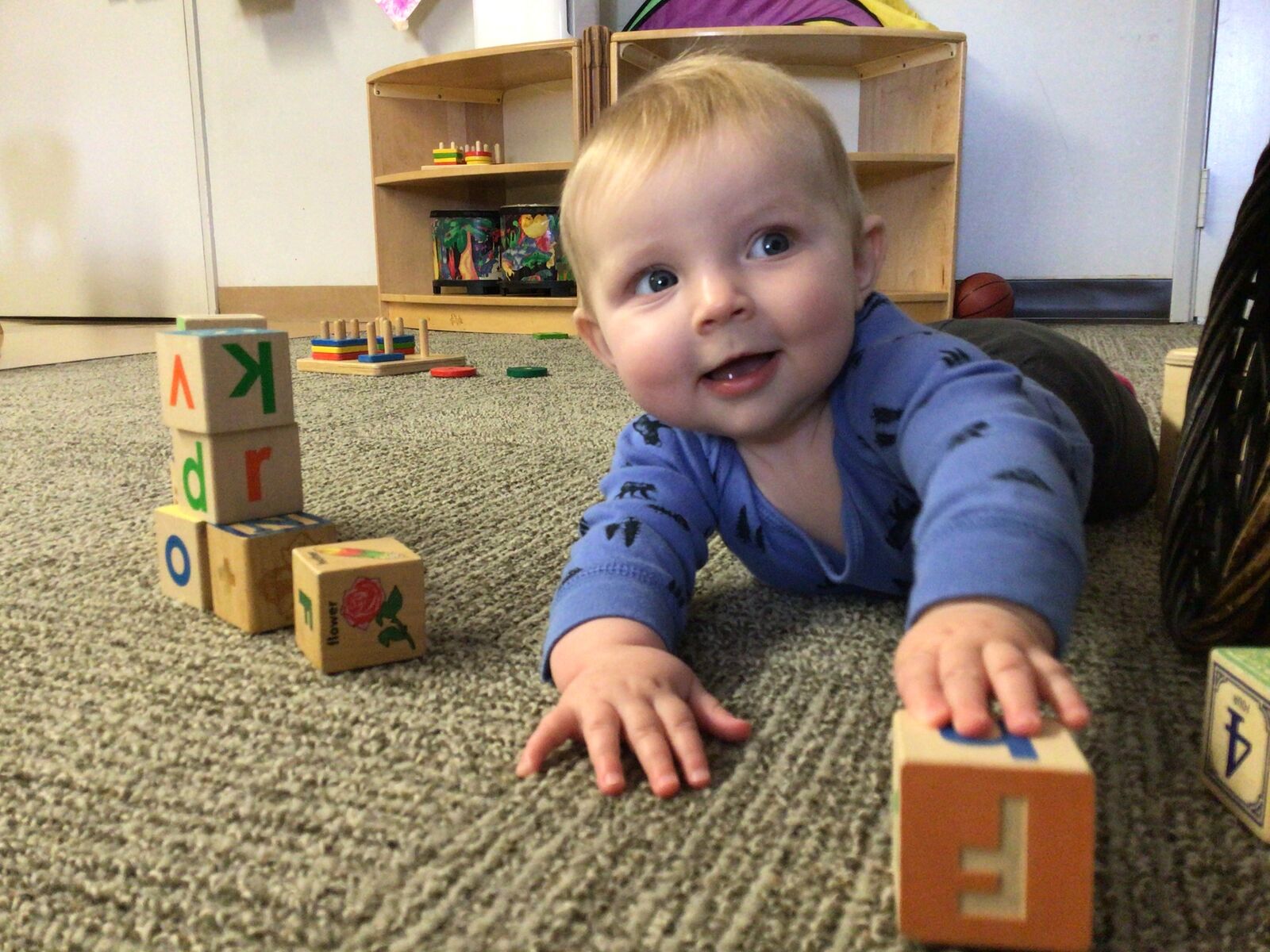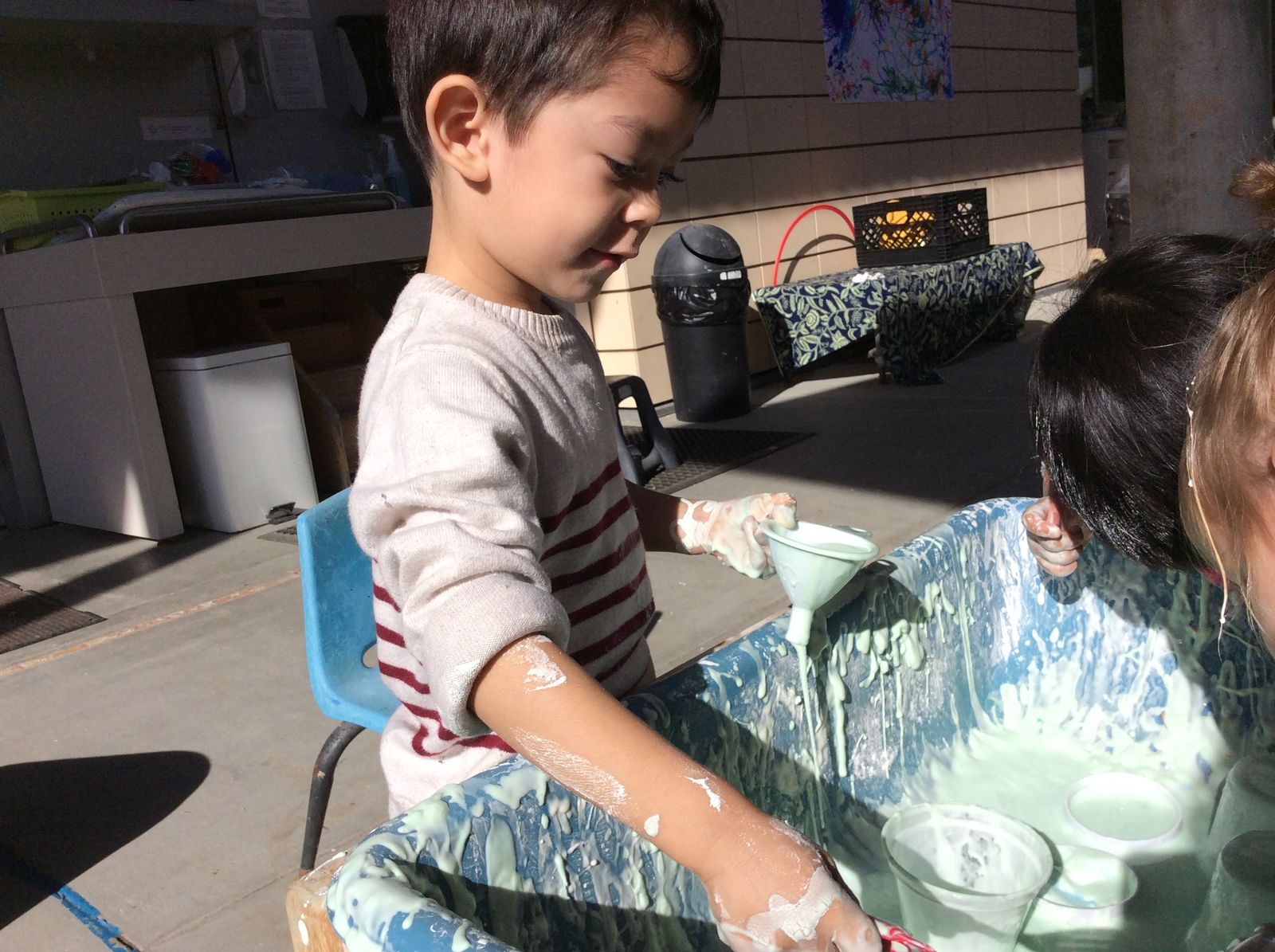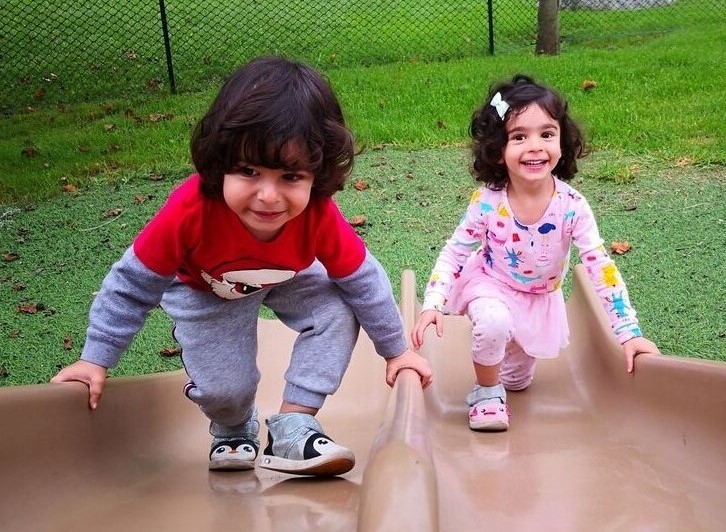ECCES is committed to quality childhood education. We hire qualified teaching staff. All Lead Teachers have a minimum of at least two years classroom experience and hold a minimum of a Master Teacher Permit issued by the State of California Commission on Teacher Credentialing. All Teachers have at least 12 units in Early Childhood Education, at least one year classroom experience and hold a minimum of an Associate Teacher Permit. Teaching Assistants are UCSB students, from many areas of study, who work part-time.
Eating together at school is a pleasant community building experience that allows time for conversation, socializing and promoting self help skills. It is an important goal of the program to provide the children with nutritious and well balanced meals and snacks while attending the Center. This commitment is reflected in the snack and lunch menu as well as in the cooking projects that take place in classrooms and social gatherings with families.
Morning & Afternoon Snacks
ECCES provides nutritious, morning and afternoon snacks for all children. We emphasize whole grains and avoid processed sugar. Whenever possible, produce may be organic.
School Lunch Option
For any child eligible through the Child and Adult Care Food Program (CACFP), we provide lunches daily at no cost. Menus are posted monthly at the centers and sent to families via ParentSquare. Please read the letter below for information on qualifying for the food program and if you would like to apply for the program, complete the Food Program Application after your child has been enrolled into one of our centers.
Food Guidelines
Foods and beverages brought from home must be packages in a spill-proof container and clearly labeled with the child's name. Foods and beverages from home shall not be shared with other children.
Food that is round, hard, small, thick and sticky, smooth, compressible or dense, or slippery tend to be involved in most choking accidents. Therefore never provide:
- Whole hot dogs or hot dogs cut into sliced rounds (lengthwise is ok)
- Whole grapes, whole cherry tomatoes (sliced in quarters or lengthwise is okay; round sides are not ok)
- Any type or size of nut or seeds:
- Spoonful of nut butter
- Nuts, popcorn
- Any type of pretzel, chips, hard candy or mashmallows
- Chunks of raw carrot (raw carrot sliced lengthwise is ok)
- Meat, larger than can be swallowed whole
- Chewing gum
We require that parents provide physician's documentation of any special needs related to a child's ability to eat and/or meet nutrition requirements. We require that parents provide physician's documentation of any food allergies a child may have using the "Medical Statement to Request Special Meals and/or Accommodation" form available at http://www.cde.ca.gov/ls/nu/sn/fm.asp
We encourage parents to share with us how their culture and/or religion may affect their child's food choices. For non-medical diets, such as vegetarian, our organization requires parents to provide written instructions on food choices, including both foods that can be eaten and those to avoid or eliminate from the child's diet. We may ask that parents provide supplemental food to accommodate these requests.
Professionals who work with young children expect to be met with challenging behavior from time to time. During the first five years of life, children are just beginning to learn how to handle their own intense emotions and conform to the behavioral expectations of society.
In an early care and education setting, we define challenging behavior as any behavior that:
- interferes with children's learning, development and success at play;
- is harmful to the child, other children or adults;
- puts a child at high risk for later social problems or school failure
It can be direct (e.g. hitting, pushing, biting, kicking) or indirect (e.g. teasing, ignoring rules or instructions, excluding others, name-calling, destroying objects, having temper tantrums).
Approaches we use may vary by age group, but have the following elements in common:
- Adults model positive behavior
- Teachers design the physical environment to minimize conflict
- Teachers maintain age appropriate expectations for children's behavior
- Teachers establish simple rules, or expectations for the classroom
- Adults closely observe and supervise children's activities and social interactions
- Adults help children verbalize their feelings, frustrations, and concerns
- Children whose behavior endangers others will be supervised away from other children
- Discipline i.e. Guidance, will always be positive, productive, and immediate when behavior is inappropriate
We are committed to each child's social emotional development and so we do not dismiss children from our program because of concerns with behavior. Behavior concerns tell us that children need more time, support and practice to develop their social and emotional skills. When serious concerns arise, we will partner with parents and professionals who specialize in supporting children's social and emotional health.
You are able to request a preference for a specific classroom. However, there is no guarantee that there will be space in any one particular classroom. ECCES will offer you a space in a classroom based on a combination of your preference, your child's age, and available space.
We love parent participation in a variety of forms: in the classroom, with school-wide projects, or on the Parent Council. Parent involvement in the classroom may include sharing a tradition or holiday important to your family, bringing in a talent for crafts, music, cooking, or other activity, or accompanying the class on field trips. School-wide projects that we need volunteers for might be helping with our garden, sewing dramatic play clothes, or organizing teacher appreciation week. And, we could not run the school without the parents who sit on our Parent Council. This creative, and energetic group represents a major resource and support system for the Centers and family support for the Council is a vital part of providing an outstanding program for all children and families served.
Screening and assessment are an integral part of high-quality early care and education programs. The purposes of the screening and assessments are multiple: One purpose is to learn about the development, interests and needs of each child which can then inform appropriate individualized teaching strategies and extend, enhance and guide each child's learning and continued development. A second purpose is to detect early signs of delay in development and/or the need for further assessment, referral or early intervention. A third is to improve curriculum and teaching practices that contribute to overall program improvements.
Ages and Stages Questionnaire (ASQ)
Our growing understanding begins at enrollment, facilitated by families, who know their child the very best. The Family Information Sheet and the Ages and Stages Questionnaire (ASQ-3) are written tools to supplement this process. All families are asked to complete the questionnaires at the initial enrollment and when the child transitions to a new classroom. This tool illuminates strengths, educates about developmental milestones, and most importantly helps to incorporate a family's expert knowledge about their child. The ASQ-3 is a reliable, valid, research-based tool that asks meaningful questions based on family's knowledge of their child.
Desired Results Developmental Profile (DRDP)
Meeting a child's individual needs requires a partnership between the program and family. It also requires that teaching staff acquire specific knowledge of each child in their care. Ongoing communication between families and the teachers is crucial. Formal assessments are conducted twice a year. At ECCES, we use a formal assessment called Desired Results Developmental Profile (DRDP). The results will be shared with families during a scheduled conference provided in the Fall/Spring. Families are always encouraged to raise questions and concerns about how assessment methods will meet their child's needs.
Please note all staff have been professionally trained on how to use the DRDP assessment tools through the California Department of Education (CDE), Early Learning Care Division. Informal assessments through everyday observations are conducted using the following methods: anecdotal notes, artwork, writing samples, Learning Stories, and pictures.






